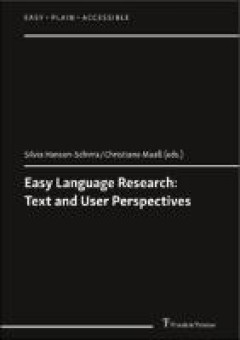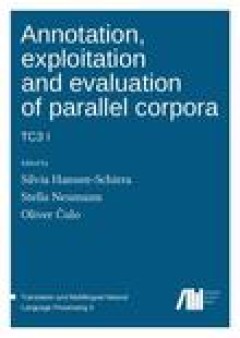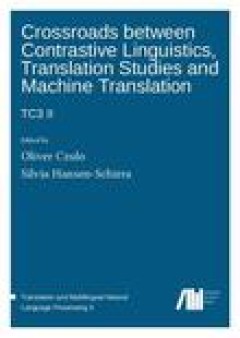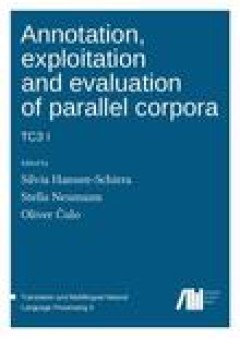Filter by

Easy language research : text and user perspectives
This volume presents new approaches in Easy Language research from three different perspectives: text perspective, user perspective and translation perspective. It explores the field of comprehensibility-enhanced varieties at different levels (Easy Language, Plain Language, Easy Language Plus). While all are possible solutions to foster communicative inclusion of people with disabilities, they …
- Edition
- vo.2
- ISBN/ISSN
- 9783732993024
- Collation
- 285 p.
- Series Title
- Easy – Plain – Accessible, 2
- Call Number
- 417.0721 EAS e
Eyetracking and applied linguistics
Eyetracking has become a powerful tool in scientific research and has finally found its way into disciplines such as applied linguistics and translation studies, paving the way for new insights and challenges in these fields. The aim of the first International Conference on Eyetracking and Applied Linguistics (ICEAL) was to bring together researchers who use eyetracking to empirically answer th…
- Edition
- -
- ISBN/ISSN
- 9783946234654
- Collation
- iv, 192 p.; 22 cm.
- Series Title
- -
- Call Number
- 418 EYE e

Annotation, exploitation and evaluation of parallel corpora
Exchange between the translation studies and the computational linguistics communities has traditionally not been very intense. Among other things, this is reflected by the different views on parallel corpora. While computational linguistics does not always strictly pay attention to the translation direction (e.g. when translation rules are extracted from (sub)corpora which actually only consis…
- Edition
- -
- ISBN/ISSN
- 9783961100248
- Collation
- 522 p.; 22 cm.
- Series Title
- Translation and Multilingual Natural Language Processing
- Call Number
- 410 ANN a

Crossroads between contrastive linguistics, translation studies and machine t…
Contrastive Linguistics (CL), Translation Studies (TS) and Machine Translation (MT) have common grounds: They all work at the crossroad where two or more languages meet. Despite their inherent relatedness, methodological exchange between the three disciplines is rare. This special issue touches upon areas where the three fields converge. It results directly from a workshop at the 2011 German As…
- Edition
- -
- ISBN/ISSN
- 9783946234265
- Collation
- 214 p.; 22 cm.
- Series Title
- Translation and Multilingual NaturalLanguage Processing 4
- Call Number
- 417.7 CRO c

Empirical modelling of translation and interpreting
"Empirical research is carried out in a cyclic way: approaching a research area bottom-up, data lead to interpretations and ideally to the abstraction of laws, on the basis of which a theory can be derived. Deductive research is based on a theory, on the basis of which hypotheses can be formulated and tested against the background of empirical data. Looking at the state-of-the-art in translatio…
- Edition
- -
- ISBN/ISSN
- 9783961100248
- Collation
- 522 p.; 22 cm.
- Series Title
- Translation and Multilingual Natural Language Processing
- Call Number
- 410 EMP e
 Computer Science, Information & General Works
Computer Science, Information & General Works  Philosophy & Psychology
Philosophy & Psychology  Religion
Religion  Social Sciences
Social Sciences  Language
Language  Pure Science
Pure Science  Applied Sciences
Applied Sciences  Art & Recreation
Art & Recreation  Literature
Literature  History & Geography
History & Geography